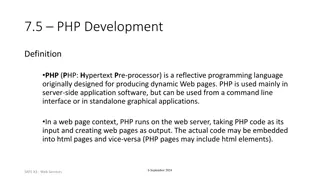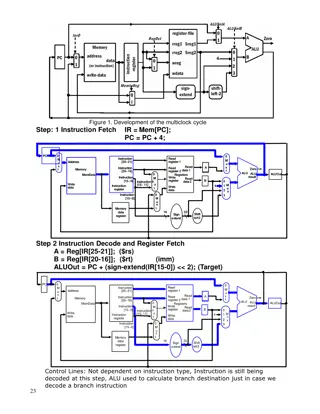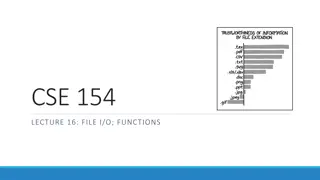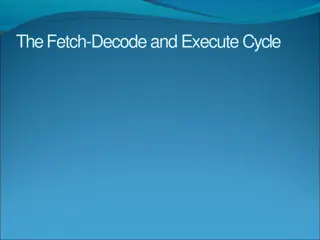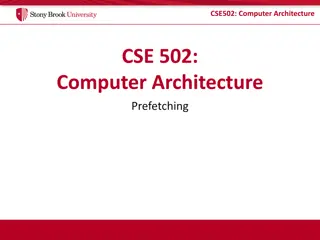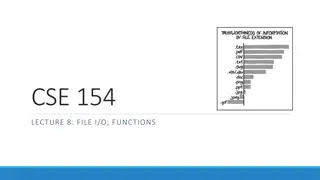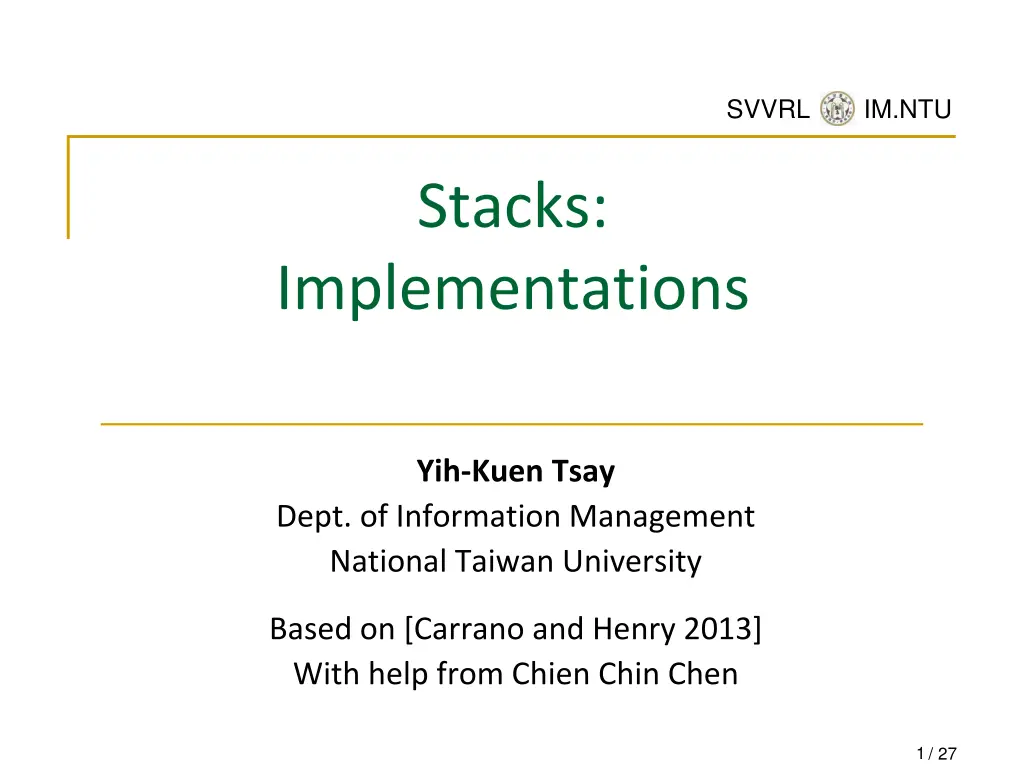
Array-Based Stack Implementations at NTU
Explore array-based stack implementations at National Taiwan University based on Carrano and Henry's work. Learn about the ADT Stack, both array-based and link-based implementations, and the modifications for exception handling.
Download Presentation

Please find below an Image/Link to download the presentation.
The content on the website is provided AS IS for your information and personal use only. It may not be sold, licensed, or shared on other websites without obtaining consent from the author. If you encounter any issues during the download, it is possible that the publisher has removed the file from their server.
You are allowed to download the files provided on this website for personal or commercial use, subject to the condition that they are used lawfully. All files are the property of their respective owners.
The content on the website is provided AS IS for your information and personal use only. It may not be sold, licensed, or shared on other websites without obtaining consent from the author.
E N D
Presentation Transcript
SVVRL @ IM.NTU Stacks: Implementations Yih-Kuen Tsay Dept. of Information Management National Taiwan University Based on [Carrano and Henry 2013] With help from Chien Chin Chen 1 / 27
SVVRL @ IM.NTU Implementations of the ADT Stack As in the case of the ADT bag, we will consider both array-based and link-based implementations. The implementations will later be modified to use exceptions . Yih-Kuen Tsay DS 2015: Stacks: Implementations 2 / 27
SVVRL @ IM.NTU An Array-Based Implementation (1/9) The basic idea Source: FIGURE 7-1 in [Carrano and Henry 2013]. Yih-Kuen Tsay DS 2015: Stacks: Implementations 3 / 27
SVVRL @ IM.NTU An Array-Based Implementation (2/9) /** ADT stack: Array-based implementation. @file ArrayStack.h */ #ifndef _ARRAY_STACK #define _ARRAY_STACK #include "StackInterface.h" const int MAX_STACK = maximum-size-of-stack; template<class ItemType> class ArrayStack: public StackInterface<ItemType> { private: ItemType items[MAX_STACK]; // Array of stack items int top; // Index to top of stack Yih-Kuen Tsay DS 2015: Stacks: Implementations 4 / 27
SVVRL @ IM.NTU An Array-Based Implementation (3/9) What if you did not hide items and top, i.e., declare them as private? The client could access any elements in the stack, not just the top element. This violates the specifications of the ADT stack. Yih-Kuen Tsay DS 2015: Stacks: Implementations 5 / 27
SVVRL @ IM.NTU An Array-Based Implementation (4/9) public: ArrayStack(); // Default constructor bool isEmpty() const; bool push(const ItemType& newEntry); bool pop(); ItemType peek() const; }; // end ArrayStack #include "ArrayStack.cpp" #endif Yih-Kuen Tsay DS 2015: Stacks: Implementations 6 / 27
SVVRL @ IM.NTU An Array-Based Implementation (5/9) /** @file ArrayStack.cpp */ #include <cassert> // For assert #include "ArrayStack.h" // Header file template<class ItemType> ArrayStack<ItemType>::ArrayStack(): top(-1) { } // end default constructor // Copy constructor and destructor are // supplied by the compiler Yih-Kuen Tsay DS 2015: Stacks: Implementations 7 / 27
SVVRL @ IM.NTU An Array-Based Implementation (6/9) template<class ItemType> bool ArrayStack<ItemType>::isEmpty() const { return top < 0; } // end isEmpty items MAX_STACK-1 top 1 -1 0 Yih-Kuen Tsay DS 2015: Stacks: Implementations 8 / 27
SVVRL @ IM.NTU An Array-Based Implementation (7/9) template<class ItemType> bool ArrayStack<ItemType>::push(const ItemType& newEntry) { bool result = false; if (top < MAX_STACK - 1) { // Stack has room for newEntry top++; items[top] = newEntry; result = true; } // end if items MAX_STACK-1 top 1 -1 0 return result; } // end push 0 Yih-Kuen Tsay DS 2015: Stacks: Implementations 9 / 27
SVVRL @ IM.NTU An Array-Based Implementation (8/9) template<class ItemType> bool ArrayStack<ItemType>::pop() { bool result = false; if (!isEmpty ()) { top--; result = true; } // end if return result; } // end pop items MAX_STACK-1 top 1 -1 0 0 Yih-Kuen Tsay DS 2015: Stacks: Implementations 10 / 27
SVVRL @ IM.NTU An Array-Based Implementation (9/9) template<class ItemType> ItemType ArrayStack<ItemType>::peek() const { assert(!isEmpty()); // Enforce precondition // Stack is not empty; return top return items[top]; } // end peek // end of implementation file returned item items MAX_STACK-1 top 1 1 0 Yih-Kuen Tsay DS 2015: Stacks: Implementations 11 / 27
SVVRL @ IM.NTU Using the Stack Implementation #include <iostream> #include <string> #include "ArrayStack.h using namespace std; int main() { StackInterface<string>* stackPtr = new ArrayStack<string>(); string anItem = ; cout << Enter a string ; cin >> anItem; // Read an item stackPtr->push(anItem); // Push item onto stack } Yih-Kuen Tsay DS 2015: Stacks: Implementations 12 / 27
SVVRL @ IM.NTU A Link-Based Implementation (1/11) The basic idea: A pointer-based implementation enables the stack to grow and shrink dynamically. topPtr is a pointer to the head of a linked list of items. Because of the dynamically allocated memory, we must write a copy constructor and a destructor. Source: FIGURE 7-2 in [Carrano and Henry 2013]. Yih-Kuen Tsay DS 2015: Stacks: Implementations 13 / 27
SVVRL @ IM.NTU A Link-Based Implementation (2/11) /** ADT stack: Link-based implementation. @file LinkedStack.h */ #ifndef _LINKED_STACK #define _LINKED_STACK #include "StackInterface.h" #include "Node.h template template<class class class LinkedStack: public { private: private: Node<ItemType>* topPtr; // Pointer to first node in the chain; // this node contains the stack s top public: public: // Constructors and destructor: LinkedStack(); // Default constructor LinkedStack(const const LinkedStack<ItemType>& aStack); // Copy constructor virtual virtual ~LinkedStack(); // Destructor class ItemType> public StackInterface<ItemType> Yih-Kuen Tsay DS 2015: Stacks: Implementations 14 / 27
SVVRL @ IM.NTU A Link-Based Implementation (3/11) // Stack operations: bool bool isEmpty() const bool bool push(const const ItemType& newItem); bool bool pop(); ItemType peek() const const; }; // end LinkedStack const; #include "LinkedStack.cpp" #endif Yih-Kuen Tsay DS 2015: Stacks: Implementations 15 / 27
SVVRL @ IM.NTU A Link-Based Implementation (4/11) /** @file LinkedStack.cpp */ #include <cassert> // For assert #include "LinkedStack.h" // Header file template template<class LinkedStack<ItemType>::LinkedStack(): topPtr(nullptr { } // end default constructor class ItemType> nullptr) topPtr points to nowhere when empty. template template<class LinkedStack<ItemType>:: LinkedStack(const { // Point to nodes in original chain Node<ItemType>* origChainPtr = aStack->topPtr; if if (origChainPtr == nullptr nullptr) topPtr = nullptr nullptr; // Original stack is empty else else { // Copy first node topPtr = new new Node<ItemType>(); topPtr->setItem(origChainPtr->getItem()); // Point to first node in new chain Node<ItemType>* newChainPtr = topPtr; class ItemType> const LinkedStack<ItemType>& aStack) Yih-Kuen Tsay DS 2015: Stacks: Implementations 16 / 27
SVVRL @ IM.NTU A Link-Based Implementation (5/11) // Copy remaining nodes while while (origChainPtr != nullptr // Advance original-chain pointer origChainPtr = origChainPtr->getNext(); nullptr) { // Get next item from original chain ItemType nextItem = origChainPtr->getItem(); // Create a new node containing the next item Node<ItemType>* newNodePtr = new new Node<ItemType>(nextItem); // Link new node to end of new chain newChainPtr->setNext(newNodePtr); // Advance pointer to new last node newChainPtr = newChainPtr->getNext(); } // end while newChainPtr->setNext(nullptr } // end if } // end copy constructor nullptr); // Flag end of chain Yih-Kuen Tsay DS 2015: Stacks: Implementations 17 / 27
SVVRL @ IM.NTU A Link-Based Implementation (6/11) origChainPtr Copy first node aStack::topPtr topPtr Copy remaining nodes origChainPtr origChainPtr aStack::topPtr newChainPtr topPtr Yih-Kuen Tsay DS 2015: Stacks: Implementations 18 / 27
SVVRL @ IM.NTU A Link-Based Implementation (7/11) Flag end of new chain origChainPtr NULL aStack::topPtr newChainPtr topPtr Yih-Kuen Tsay DS 2015: Stacks: Implementations 19 / 27
SVVRL @ IM.NTU A Link-Based Implementation (8/11) template template<class LinkedStack<ItemType>::~LinkedStack() { // Pop until stack is empty while while (!isEmpty ()) pop(); } // end destructor class ItemType> responsible for returning dynamically allocated memory to system. template template<class bool bool LinkedStack<ItemType>::isEmpty() const { return return topPtr == nullptr nullptr; } // end isEmpty class ItemType> const Yih-Kuen Tsay DS 2015: Stacks: Implementations 20 / 27
SVVRL @ IM.NTU A Link-Based Implementation (9/11) template template<class bool bool LinkedStack<ItemType>::push(const { Node<ItemType>* newNodePtr = new topPtr = newNodePtr; newNodePtr = nullptr nullptr; return return true true; } // end push class ItemType> const ItemType & newItem) new Node<ItemType>(newItem, topPtr); newNodePtr topPtr Yih-Kuen Tsay DS 2015: Stacks: Implementations 21 / 27
SVVRL @ IM.NTU A Link-Based Implementation (10/11) template template<class bool bool LinkedStack<ItemType>::pop() { bool bool result = false false; if if (!isEmpty()) { // Stack is not empty; delete top Node<ItemType>* nodeToDeletePtr = topPtr; topPtr = topPtr->getNext(); class ItemType> // Return deleted node to system nodeToDeletePtr->setNext(nullptr); delete delete nodeToDeletePtr; nodeToDeletePtr = nullptr nullptr; result = true } // end if true; nodeToDeletePtr return return result; } // end pop topPtr Yih-Kuen Tsay DS 2015: Stacks: Implementations 22 / 27
SVVRL @ IM.NTU A Link-Based Implementation (11/11) template template<class ItemType LinkedStack<ItemType>::peek() const { assert assert(!isEmpty()); // Enforce precondition class ItemType> const // Stack is not empty; return top return return topPtr->getItem(); } // end peek // end of implementation file Yih-Kuen Tsay DS 2015: Stacks: Implementations 23 / 27
SVVRL @ IM.NTU Using Exceptions (1/3) /** @file PrecondViolatedExcep.h */ #ifndef _PRECOND_VIOLATED_EXCEP #define _PRECOND_VIOLATED_EXCEP #include <stdexcept> #include <string> using using namespace namespace std; class class PrecondViolatedExcep: public { public: public: PrecondViolatedExcep(const }; // end PrecondViolatedExcep #endif public logic_error const string& string& message = ""); Yih-Kuen Tsay DS 2015: Stacks: Implementations 24 / 27
SVVRL @ IM.NTU Using Exceptions (2/3) /** @file PrecondViolatedExcep.cpp */ #include "PrecondViolatedExcep.h" PrecondViolatedExcep::PrecondViolatedExcep(const logic_error("Precondition Violated Exception: " + message) { } // end constructor const string& string& message): Yih-Kuen Tsay DS 2015: Stacks: Implementations 25 / 27
SVVRL @ IM.NTU Using Exceptions (3/3) Change to the declaration of peek: ItemType peek() const const throw throw(PrecondViolatedExcep); Change to the implementation of peek: template template<class ItemType LinkedStack<ItemType>::peek() const class ItemType> const throw throw(PrecondViolatedExcep) { // Enforce precondition if if (isEmpty()) throw throw PrecondViolatedExcep( peek() called with empty stack ); // Stack is not empty; return top return return topPtr->getItem(); } // end peek Yih-Kuen Tsay DS 2015: Stacks: Implementations 26 / 27
SVVRL @ IM.NTU Comparing Implementations Fixed versus dynamic sizes: A statically allocated array-based implementation. The size is known in advance, e.g., 80 characters in one line. Prevents the push operation from adding an item to the stack, if the array is full. A dynamically allocated pointer-based (or dynamically allocated array-based) implementation. No size restriction on the stack. Copy data between dynamically allocated data structures. Yih-Kuen Tsay DS 2015: Stacks: Implementations 27 / 27






